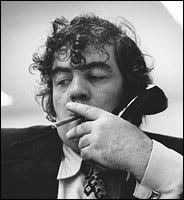Booze And News
 Are journalists a bunch of pill-popping, booze-swilling, philandering mental basket cases, and if so, how does that effect the quality of journalism?
Are journalists a bunch of pill-popping, booze-swilling, philandering mental basket cases, and if so, how does that effect the quality of journalism?Or is the hard-living journalist a thing of the past, and today's sterile, uninteresting, corporate-speak news a producte of too little self-destruction?
Interesting questions,eh? They've been asked, and have raised a bit of a buzz, in an article just published in Columbia Jouranlism Review about a paper titled "Depression, Drink and Dissipation" by Doug Underwood, which appeared in the journal Journalism History.
Published in the winter 2007 volume of Journalism History, "Depression, Drink and Dissipation" finds that almost half of the best people to ever push a noun against a verb in newsprint were debilitated by depression, serious anxiety, or bipolar disorder; over a third were titanic drunks, pill-poppers, or opium-addicts; nearly a third were serial philanderers, and a sizable bunch were misogynists, man-eaters, or violent bullies. In almost every case, the tendency to booze, carouse, or otherwise self-annihilate developed or seriously deepened during their days in journalism. All this is enough to make Underwood, who left a career covering politics for the Seattle Times to teach at the University of Washington, wonder whether "these behaviors and the choice of journalism and writing as a career are perhaps not unrelated." Well, yeah.Underwood's definition of "journalist" is pretty broad, as it includes novelists and playwrightes to may have earned a few bucks in their lean years as journalists, like Ernest Hemingway. But let's not quibble with details because:
His research spans over 300 years -- from Daniel Defoe (1660-1731) to Rick Bragg (1959-) -- and benefits from a survey of more than 900 staffers at the fifty largest-circulation daily newspapers, asking which writers have influenced their work. Any writer named twice or more was added to the big list. The remaining names were added based on Underwood's judgment. ...
Underwood lists nineteen literary journalists, including Agee, Ring Lardner, and Robert Benchley, who died from drinking. Seven others, among them George Orwell and Mark Twain, killed themselves smoking. William Dean Howells and A.J. Liebling were two of thirteen who ate their way to an early grave. Then there are the suicides: goodbye Gloria Emerson, Ernest Hemingway, and Hunter S. Thompson.
Two famous hard-living journalists, Pete Hamill and Jimmy Breslin [that's Breslin in the photo], think all this carousing has been good for journalism, and blame clean-living for the state of journalism today:
For over a decade, the two ex-hard drinkers and legendary newsmen have been saying that print owes its readership woes to a dead corporate air in the newsroom. "Everything's more restrained and we've lost a certain edge," Hamill told the Denver Post in 1995. Meanwhile, Breslin knows what's missing: "It's the drinking." They grouse that today's reporters forgo drinking clubs and bawdy pals in favor of health clubs and quiet homes.
The journalist Underwood profiles has inner demons that make him angry, skeptical and distrustful of authority; traits many would say are foundational to great investigative journalism and political coverage. Breslin said it well:
"Rage is the only quality which has kept me, or anybody I have ever studied, writing columns for newspapers."
CEJ's writer, Tony Dokoupil, asks the pointed question:
For good or ill, journalism and neurosis may be inextricably caught up together, tangled in the timeless conundrum of what comes first. Does the profession break talented people with steady pressure, severe constraints, and public censure for missteps? Or does it attract broken talent who seek unstable schedules, extreme experiences, and the megalomaniacal pleasure of their name in print?From my personal experience as a j-school grad and ex-journalist, it's decidedly the latter. Deadline pressure, a varied and challenging life and seeing my name in print made journalism very attractive to me, as did anger. Idiot that I was, I was thrilled when Woodward and Bernstein brought down a president.
Newsrooms today are not cigarette strewn and whiskey bottles aren't tucked away in too many desks, but I don't think the attractions of journalism have changed, so the nice face reporters put on themselves is, to a large degree, phony -- and the higher up the pecking order, the more phoney it's likely to be.
The same insecurities and angers still fuel the industry, but they're more hidden. There are pills in the purse and the booze in the apartment -- and probably even more desire to lash out, since secrecy just breeds more negative behavior.Labels: Journalism, Media, MSM




<< Home